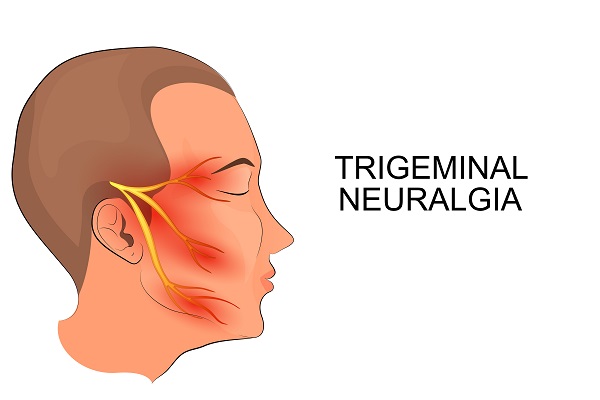What is trigeminal neuralgia?
Trigeminal neuralgia [1] is a type of facial pain. It is caused by a problem with the trigeminal nerve, which is a nerve that is responsible for sensation in the face.
- The pain is typically described as sharp, brief, electrical.
- The pain is usually in the cheek, mouth, gum or teeth area. More rarely it can be in the eye or forehead, but in this case your doctor will think about other causes.
- The pain can be triggered by touching, even lightly, certain parts of the face or mouth (what is called trigger zones). Talking, chewing, shaving, anything that involves the face and mouth can trigger. Cold wind, cold foods or beverages can also trigger.
- The pain can occur only with triggers, or spontaneously. There may be periods where the pain is very frequent, and periods of remission.
- Usually there is not pain between the shocks, but in some cases a constant pain can be felt
What causes trigeminal neuralgia?
Anything that compresses or irritates the trigeminal nerves can cause this type of pain. Some conditions that can cause trigeminal neuralgia include:
- Any tumor pushing on a nerve
- Multiple sclerosis, as the myelin that protects the nerve can be damaged
- A blood vessel running close to the nerve (vascular loop)
- Infections with varicella or herpes viruses can also cause neuralgias
- Anything else pushing on the nerve root or branches

I feel the pain in my tooth. Can the dentist just remove it?
That’s a very important thing to discuss. The pain of trigeminal neuralgia may be felt in the gum or tooth, but it does NOT come from a problem in the tooth. It comes from a problem upstream, in the portion of the nerve that is inside the skull. If the dentist says that your teeth are OK and do not require interventions, don’t get any. An intervention might actually fire things up and worsen your situation. Of course, if you have trigeminal neuralgia you may also get a true tooth problem, in which case that should be treated as it may deteriorate the pain.
Who is more at risk for trigeminal neuralgia?
It affects people mostly above the age of 50, although it can happen at younger ages and in children. Females are slightly more affected than males.
Any young person with trigeminal neuralgia should be investigated for multiple sclerosis or another cause.
How can my doctor diagnose trigeminal neuralgia?
There is no specific test that can diagnose this condition. It is a clinical diagnosis, meaning, your doctor will diagnose this based on your description of the attacks along with a neurological examination. Usually, an MRI of the brain will be done to look for compression on the nerve, but very often the test comes back normal.
What treatments could I use for trigeminal neuralgia?
Trigeminal neuralgia can be extremely disabling if the pain is not controlled. Medications used for this are targeting the nerves. They treat «neuropathic pain» (a fancy term to say that the pain comes from irritated nerves). Some medications (most of them anti-seizure drugs) that can be used are:
- Gabapentin (Neurontin) and Pregabalin (Lyrica)
- Carbamazepine (Tegretol) and oxcarbazepine (Trileptal)
- Phenytoin (Dilantin)
- Baclofen
- Lamotrigine (Lamictal)
Usually the doctor will try to avoid opioids (morphine-type medications) for neuralgias, but in severe cases they may be used.
Can I get surgery or other procedures for this problem?
Yes. Surgery can be recommended, especially if the medications are not working. This is always a decision that should be made with discussion between the person suffering, the neurologist and the surgeon. Also, radiotherapy can be used for trigeminal neuralgia. Options include:
- Brain surgery (with an opening of the skull) to put a pad between the nerve and an artery close to it. This is called Neurovascular decompression.
- Radiotherapy (sending rays in a very focused way on the zone that relays pain in the brainstem)
- Block of the trigeminal nerve or ganglion
- Botox (injections in the face)
Your doctor can discuss these with you if they are required.
In summary, trigeminal neuralgia is a type of facial pain that can be very disabling. Seeing a neurologist is usually necessary to look over different causes and try different treatments.
To read more on trigeminal neuralgia and find support:
http://tnac.org/tnac/ [2]
Post#408
